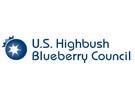A new research study published in Clinical Nutrition finds that the equivalent of one cup of fresh blueberries, consumed as 26 g of freeze-dried blueberries, may reduce the acute cardiometabolic burden of energy-dense meals. Simply put: blueberries may benefit heart health.
This emerging study finds that adding anthocyanin-rich blueberries (364 mg anthocyanin and 879 mg phenolics) to a high calorie, high-fat/high-sugar meal (969 kcal, 64.5g fat, 84 g carbohydrate) results in reduced insulin and glucose levels, lower total cholesterol and improved good cholesterol (HDL-C) and its related lipoproteins (fractions of HDL-P and Apo-A1) in the 24 hours following the meal.
These findings are noteworthy because elevated post-meal glucose and impaired glucose tolerance are associated with increased heart disease risk, which is already elevated in people with metabolic syndrome.
"This is the first study of its kind conducted in an at-risk population, adults with metabolic syndrome," said Aedin Cassidy, PhD, chair of nutrition & preventive medicine and director of Interdisciplinary Research Institute for Global Food Security, Queen's University, Belfast, Ireland and the study's lead investigator.
The study, which was supported by funding from the U.S. Highbush Blueberry Council, is a secondary analysis of the primary study, which looked at the longer-term effects of blueberry consumption and found that participants with metabolic syndrome who consumed the equivalent of one cup of fresh blueberries per day showed clinically relevant improvements in measures of heart health over six months.
Further studies are now required to elucidate the effect of mastication, the role of the enteric nervous system (with regards to the gut-brain axis) and food matrix attributable differences on postprandial responses, when providing whole blueberries as fresh versus a pragmatically selected stable, homogeneous freeze-dried powder.
"While further studies are warranted, our results suggest adding just a single cup serving of anthocyanin-rich foods like blueberries to high-fat/high-sugar and energy dense meals should be advocated to reduce the acute postprandial increases in risk markers like glucose, insulin and cholesterol," said Cassidy.
The USHBC had no role in study design, data collection, data analysis, data interpretation or writing of the study. For more on blueberry nutrition research click here.
 For more information:
For more information:
U.S. Highbush Blueberry Council
www.ushbc.blueberry.org
www.nabcblues.org
